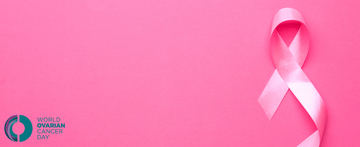Blog
Facts On World Ovarian Cancer Day 2023
by
Kate Young
on
Aug 05, 2023
Facts On World Ovarian Cancer Day 2023
Many of us know someone who has dealt with some form of cancer in their life. Understanding the ins and outs of it can help bring comfort to those living with cancer and those who love them. Today is World Ovarian Cancer Day 2023, and with that let’s take a moment to understand this particular kind of cancer. We can also dedicate some attention to understanding why an
ovarian cancer test might be the best gift that you can consider. Here are some of the most interesting facts about ovarian cancer to get you started.
FACT: Symptoms of ovarian cancer can be tricky to spot
As many can learn, when we discover someone we love is living with cancer, symptoms can be hard to notice or sometimes invisible to us daily. Ovarian cancer symptoms are amongst those that can be overlooked for something else that seems more logical.
Some symptoms include back pain, a decreased appetite, feeling bloated, or having a lot of stomach aches. Pain in the stomach or pelvis is also common and can be mild or severe. Other symptoms can include fatigue, losing weight, needing to pee more frequently, and dealing with indigestion, constipation, or diarrhoea.
While annoying and inconvenient, most wouldn’t assume these are ovarian cancer symptoms.
As part of noting World Ovarian Cancer Day this year, keep these symptoms in mind to help you detect an issue sooner rather than later.
FACT: A GP will ask about your family history
If you receive abnormal results from an
ovarian cancer test or check with your GP about possible symptoms, one of the first things they’ll ask about is your family history. There is a
strong connection between having a family history of breast or ovarian cancer and a patient diagnosed with ovarian cancer.
Ovarian cancer is widespread, too, so if your GP asks about family history, it’s to see your risk level. In the UK,
1 in 50 women will be diagnosed with ovarian cancer in their life.
FACT: Ovarian cancer is often caught late
Early diagnosis and intervention are important when dealing with any kind of cancer. There’s no better time than Ovarian Cancer Day to prompt you to consider testing or, at the least, check in with your GP!
Ovarian cancer is often diagnosed late in life, though this doesn’t mean that late diagnosis means a negative prognosis. Even when detected late in life, ovarian cancer is treatable. Of course, the earlier it is detected, the better. Over
80% of women between ages 15-44 who receive treatment for cancer survive for at least ten years.
Early detection, diagnosis, and treatment will be the best way to help assure a long and healthy life!
FACT: Post-menopausal women are more commonly diagnosed with ovarian cancer
Despite the survival rates above,
women over 50 (or those considered post-menopausal) are most commonly diagnosed with ovarian cancer. There are a lot of risk factors for ovarian cancer. Age and ovulation cycles are thought to factor in why ovarian cancer is so common later in a woman’s life.
FACT: Ovarian cancer is not as common as it used to be
There is some good news! While the numbers may seem condemning, the reality is very different. Ovarian cancer may be common, but diagnosis rates have decreased recently. In the UK, there is a
5% reduction in ovarian cancer diagnoses.
This is thought to be partly due to more women being on oral contraceptives most of their lives. This also pairs with a decreased use of menopausal hormone therapy. Before, this could increase the likelihood of developing ovarian cancer.
How to know if it’s cancer or something else?

From symptoms to family history, ovarian cancer is just one of the many things your body could be dealing with. As part of marking World Ovarian Cancer Day 2023, take the time to educate yourself on ovarian cancer symptoms to see if you notice any of these in your daily life.
Typically, these symptoms are considered “notable” if you are experiencing any or all of these more than
12 times a month. If this sounds familiar, please consider ordering an
ovarian cancer test. Conducted at home on your schedule, the test will detect normal or abnormal test results. It can give you the information to book an appointment with your GP for more specialised and personalised testing.
Being in your best health starts with early diagnosis and early intervention. If you or someone you love is at risk of ovarian cancer, getting an in-depth look at what you’re dealing with is the best way to help make the most out of living with ovarian cancer. There is no better day to proactively care for your health than World Ovarian Cancer Day 2023.
 From symptoms to family history, ovarian cancer is just one of the many things your body could be dealing with. As part of marking World Ovarian Cancer Day 2023, take the time to educate yourself on ovarian cancer symptoms to see if you notice any of these in your daily life.
Typically, these symptoms are considered “notable” if you are experiencing any or all of these more than 12 times a month. If this sounds familiar, please consider ordering an ovarian cancer test. Conducted at home on your schedule, the test will detect normal or abnormal test results. It can give you the information to book an appointment with your GP for more specialised and personalised testing.
Being in your best health starts with early diagnosis and early intervention. If you or someone you love is at risk of ovarian cancer, getting an in-depth look at what you’re dealing with is the best way to help make the most out of living with ovarian cancer. There is no better day to proactively care for your health than World Ovarian Cancer Day 2023.
From symptoms to family history, ovarian cancer is just one of the many things your body could be dealing with. As part of marking World Ovarian Cancer Day 2023, take the time to educate yourself on ovarian cancer symptoms to see if you notice any of these in your daily life.
Typically, these symptoms are considered “notable” if you are experiencing any or all of these more than 12 times a month. If this sounds familiar, please consider ordering an ovarian cancer test. Conducted at home on your schedule, the test will detect normal or abnormal test results. It can give you the information to book an appointment with your GP for more specialised and personalised testing.
Being in your best health starts with early diagnosis and early intervention. If you or someone you love is at risk of ovarian cancer, getting an in-depth look at what you’re dealing with is the best way to help make the most out of living with ovarian cancer. There is no better day to proactively care for your health than World Ovarian Cancer Day 2023.














